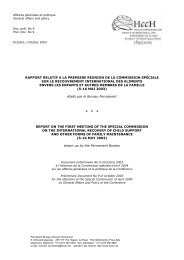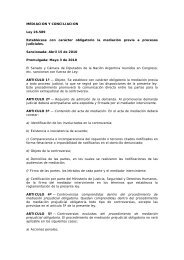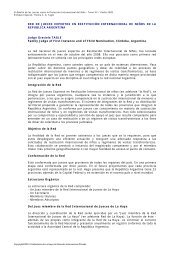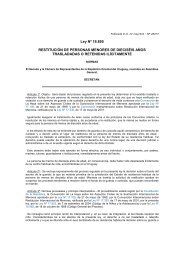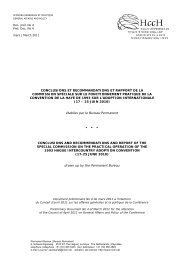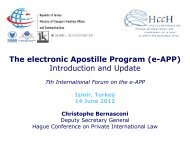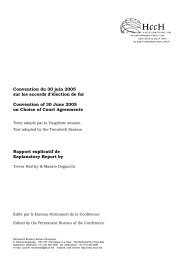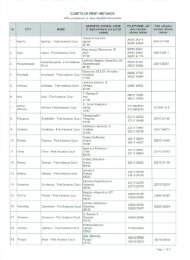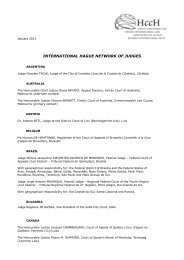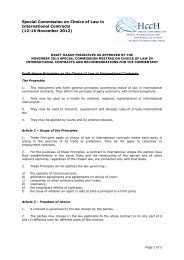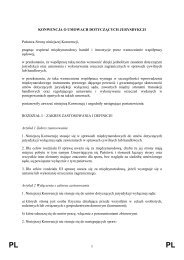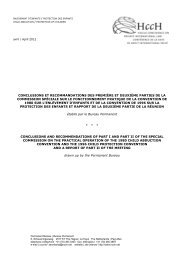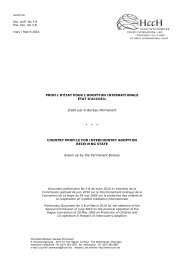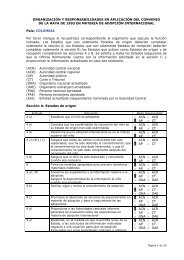aperçu des réponses au questionnaire accompagnant la ... - HCCH
aperçu des réponses au questionnaire accompagnant la ... - HCCH
aperçu des réponses au questionnaire accompagnant la ... - HCCH
You also want an ePaper? Increase the reach of your titles
YUMPU automatically turns print PDFs into web optimized ePapers that Google loves.
Question Réponse / Reply État / State<br />
8.3. Actions to<br />
expedite service procedures?<br />
foreign <strong>la</strong>nguage, service can only be effected if the document is trans<strong>la</strong>ted into one of the official<br />
<strong>la</strong>nguages of Fin<strong>la</strong>nd, i.e. Finnish or Swedish, or if the addressee must be deemed to understand the foreign<br />
<strong>la</strong>nguage. Accordingly, e.g.. companies with international business re<strong>la</strong>tions must be deemed to understand English,<br />
German or French.<br />
Trans<strong>la</strong>tion into Slovak is required for service under Art. 5(1)(a), unless it can be concluded that the addressee<br />
understands the <strong>la</strong>nguage of the document (unless specifically pointed out by the requesting <strong>au</strong>thority, such<br />
presumption is applied to the nationals of the requesting State residing on the territory of Slovakia).<br />
Specific agreement on <strong>la</strong>nguage in re<strong>la</strong>tion to the Hague Convention exists only in the re<strong>la</strong>tion with the Czech<br />
Republic, but it could be argued that provisions on <strong>la</strong>nguage of bi<strong>la</strong>teral treaties (regu<strong>la</strong>ting judicial assistance)<br />
might be applicable, though the question is more theoretical than practical.<br />
It is necessary to trans<strong>la</strong>te all the documents, which are to be served, but if the recipient is the citizen of the<br />
State of origin of documents it’s considered tat the trans<strong>la</strong>tion of documents to be served is not necessary.<br />
La France n’a pas formulé d’exigence particulière quant <strong>au</strong>x traductions <strong>des</strong> actes ou <strong>des</strong> pièces. Aux termes de<br />
l’article 688-6 du nouve<strong>au</strong> code de procédure civile français, « L'acte est notifié dans <strong>la</strong> <strong>la</strong>ngue de l’État<br />
d’origine.» .Ce texte n’en protège pas moins le <strong>des</strong>tinataire de l’acte en prévoyant que dans le cas où il « ne<br />
connaît pas <strong>la</strong> <strong>la</strong>ngue dans <strong>la</strong>quelle l’acte est établi » [il] « peut en refuser <strong>la</strong> notification et demander que celui-ci<br />
soit traduit ou accompagné d’une traduction en <strong>la</strong>ngue française, à <strong>la</strong> diligence et <strong>au</strong>x frais de <strong>la</strong> partie<br />
requérante ».<br />
Lorsque le <strong>des</strong>tinataire n'accepte pas <strong>la</strong> remise de l'acte, celui-ci ne pourra lui être signifié ou notifié formellement<br />
que s'il est rédigé dans <strong>la</strong> <strong>la</strong>ngue de l'<strong>au</strong>torité requise ou accompagné d'une traduction. En d'<strong>au</strong>tres termes, les<br />
<strong>au</strong>torités suisses n'exigent une traduction qu'à partir du moment où le <strong>des</strong>tinataire n'accepte pas <strong>la</strong><br />
notification.<br />
Rép. Slovaque<br />
L’Etat italien n’a pas conclu d’accords en <strong>la</strong> matière. Italie<br />
Agreements between the agreeing states concerning <strong>la</strong>nguage requirements according to point b) of article 20 of the<br />
Convention had not been made.<br />
Ukraine<br />
France<br />
Suisse<br />
Bé<strong>la</strong>rus<br />
Requirements for trans<strong>la</strong>tion are subject to the fifth article of the convention. Koweït<br />
No trans<strong>la</strong>tion required. However, trans<strong>la</strong>tion of a summary is <strong>des</strong>irable. There are no agreements with<br />
other countries.<br />
The Irish Central Authority invariably stipu<strong>la</strong>tes a time period within which the server engaged on its behalf is<br />
required to serve the necessary documents. Given the usual difficulties in effecting personal service, extensions of<br />
time for such service are often requested and granted.<br />
Pays-Bas<br />
Ir<strong>la</strong>nde<br />
The standard period is 8 weeks. After this period has e<strong>la</strong>psed, a reminder is sent, with differing results. Pays-Bas<br />
As noted above, the Central Authority has attempted to improve its ability to make formal service of process<br />
pursuant to a Convention request by outsourcing to a private contractor, Process Forwarding International.<br />
We believe that this has greatly improved our ability to execute a service request in an efficient and<br />
timely fashion. In the past, requests for formal service made to the Central Authority would be forwarded to the<br />
U.S. Marshall Service for the federal judicial district where the service recipient resided. Given the heavy workloads<br />
in many <strong>la</strong>rge urban jurisdictions, there could be significant de<strong>la</strong>ys in having the Marshal Service complete service.<br />
Under the new contract with Process Forwarding International, all service must be made and the certificates of<br />
service returned within six weeks; in many cases service is completed even sooner. In contrast, prior to the<br />
outsourcing of service of process functions, a service request could take any where from six months to one year or<br />
longer to complete.<br />
Etats-Unis<br />
Page 22 of 69



